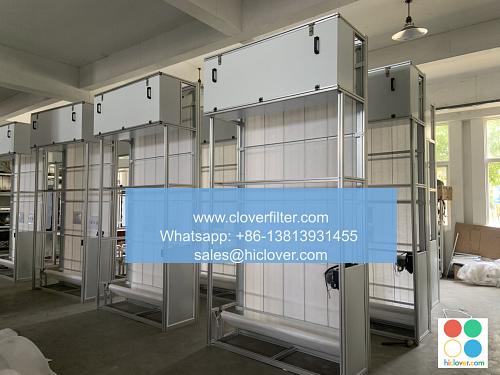Automatic Roll Air Filters: A Key Component in Montreal Biotech Cleanroom Design

In the realm of biotechnology, particularly in cities like Montreal where the industry is thriving, cleanrooms play a crucial role in ensuring the quality and purity of products. These controlled environments are crucial for preventing contamination and maintaining the integrity of-sensitive biological materials and processes. Among the various components that make up a cleanroom, air filtration systems are paramount. This is where Automatic Roll Air Filters (ARAF) come into play, offering a cutting-edge solution for maintaining the cleanliness and air quality within these sensitive spaces.
At the heart of any cleanroom is the need for precise control over the environment. This includes temperature, humidity, and most importantly, air quality. Traditional air filtration systems can be effective but often come with drawbacks such as higher maintenance costs, space requirements, and less efficient filtration capabilities compared to newer technologies. Automatic Roll Air Filters are designed to address these challenges by providing a continuous, uninterrupted supply of filtered air. These systems work by automatically rolling out new filter media as the old becomes saturated, ensuring consistent air quality without the need for manual intervention or downtime.
The design and operation of ARAF systems make them particularly suited for biotech cleanrooms in Montreal. Firstly, they offer high-efficiency filtration, capable of capturing particles as small as 0.3 microns, which includes dust, pollen, and other airborne contaminants that could compromise the sterility of a cleanroom. This level of filtration is crucial in biotechnology applications where even the smallest particles can contaminate cell cultures, disrupt sensitive equipment, or ruin experimental samples.
Furthermore, ARAF systems are designed with longevity and low maintenance in mind. The roll filter media can last for extended periods, depending on the usage and air quality conditions, and when it does eventually need replacing, the process is straightforward and minimizes downtime. This aspect is especially beneficial in a biotech setting where any halt in operations can result in significant financial and research losses. Additionally, the automated nature of these filters ensures that the cleanroom maintains its ISO classification standards consistently, which is critical for complying with regulatory requirements and ensuring product integrity.
Another significant advantage of incorporating ARAF into cleanroom design is their space efficiency. Unlike traditional filtration systems that may require substantial room for the filters themselves and the ductwork associated with them, ARAF systems are often more compact. This feature allows for more flexible and efficient use of space within the cleanroom, enabling the inclusion of more equipment, workstations, or even expanding the room’s capacity without sacrificing air quality.
In Montreal, where the biotech industry is rapidly evolving, the adoption of advanced cleanroom technologies like ARAF is not just beneficial but necessary for staying competitive. The city’s thriving research and development sector, coupled with its strong pharmaceutical and biotechnology manufacturing base, creates a high demand for cleanrooms that can meet the most stringent standards of purity and control. By integrating Automatic Roll Air Filters into their design, these facilities can ensure a higher level of air quality, reduce operational costs over time, and contribute to the advancement of biomedical research and product development.
Moreover, the energy efficiency of ARAF systems is another factor that aligns well with the growing emphasis on sustainability in the biotech sector. By minimizing the energy required for air filtration, these systems help reduce the carbon footprint of cleanroom operations, contributing to a more environmentally friendly approach to research and manufacturing. This is particularly important in a city like Montreal, which has set ambitious targets for reducing greenhouse gas emissions and is fostering an ecosystem that supports green and sustainable technologies.
In conclusion, Automatic Roll Air Filters represent a significant advancement in cleanroom technology, particularly for biotech applications in Montreal. Their ability to provide continuous, high-efficiency air filtration with minimal maintenance and downtime makes them an essential component in the design of modern cleanrooms. As the biotechnology industry continues to evolve, the demand for advanced, reliable, and efficient cleanroom technologies will only grow, positioning ARAF systems as a critical part of future cleanroom designs.
Conclusion
The integration of Automatic Roll Air Filters in biotech cleanrooms is a forward-thinking approach that addresses the pressing need for high air quality, low maintenance, and energy efficiency. As Montreal continues to be a hub for biotechnological innovation, embracing such technologies will be crucial for fostering an environment that supports groundbreaking research, development, and manufacturing. By focusing on advanced cleanroom design elements like ARAF, the biotech community in Montreal can drive progress, ensure compliance with stringent regulatory standards, and contribute to the global effort to push the boundaries of biomedical science and technology.
FAQs
Q: What are Automatic Roll Air Filters, and how do they work?
A: Automatic Roll Air Filters are advanced air filtration systems designed for cleanrooms. They work by automatically rolling out new filter media as the old becomes saturated, ensuring continuous and efficient air filtration without manual intervention.
Q: Why are ARAF systems beneficial for biotech cleanrooms in Montreal?
A: ARAF systems offer high-efficiency filtration, low maintenance, and are space-efficient, making them ideal for biotech applications where air quality and minimal downtime are critical.
Q: How do ARAF systems contribute to sustainability in biotech operations?
A: By minimizing energy consumption for air filtration, ARAF systems help reduce the carbon footprint of cleanroom operations, aligning with the growing emphasis on sustainability in the biotech sector.
Q: Can ARAF systems be integrated into existing cleanroom designs?
A: Yes, ARAF systems can be incorporated into both new and existing cleanroom designs, offering a flexible solution for enhancing air quality and operational efficiency.

